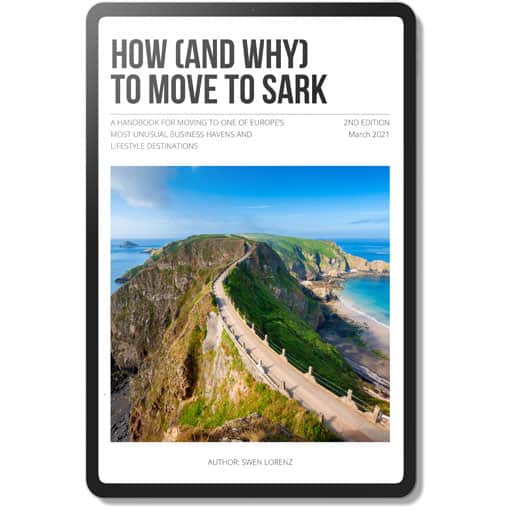If you don’t want to spend your life living off an ordinary professional salary yet paying million(s) in taxes, what can you do?
Today’s generation of professionals (and entrepreneurs) who are in their 20s, 30s and 40s have more choices than ever before. The same holds true even for older people, provided they are physically and mentally fit.
All potential solutions will require fairly substantial life changes. There is no such thing as a free lunch, least of all in the day and age of all-powerful bureaucracies and surveillance states. But you do have options.
What doesn’t work
People regularly ask me the following:
- “Can I set up an online company abroad and keep my money tax-free at the company’s domicile?“
- “Where can I open a secret bank account and hide money from my tax authorities?“
- “Could I pretend to live in a country with lower taxes but keep on living in my home country? I do have a cat and a garden which I would miss…“
These are all ignorant, naïve and even dangerous ideas.
Since the 1980s, Western governments have expanded their bureaucracies, increased their electronic surveillance and tightened penalties for anyone who doesn’t play along.
There is no bank secrecy anymore. Countries that used to be “tax havens” have by now all signed up to global agreements about information exchange, sending data about your bank accounts, income and ownership of companies to your home country government.
Forget everything you thought you knew about tax havens.
You will by now have a global tax number, a so-called TIN. You can’t open a bank account anymore without providing your TIN. It’s like having a universal tax tracking code tattooed into your skin. (How long until they send tax rule breakers to die in The Hunger Games?)
Forget everything you thought you knew about tax havens. The concept of using other jurisdictions to hide any income or asset ownership from tax authorities has gone out the window as of 2016/17.
Your only way out nowadays is to physically leave the jurisdiction that is giving you grief.
That’s the only answer. There is no other one.
Though within that are several options for you.
Option #1: Digital nomad
Given that you have found your way to my website, you will probably already be familiar with the concept.
Take your laptop and perpetually travel the world. Never stay in any one country for more than 89 days. That way, you will be considered a tourist wherever you go, and don’t have to pay any taxes. At least, that’s what many people claim (mainly those who sell products and services for digital nomads).
To which I say: “Maybe“.
It is true that at least in theory, this is a loophole in most existing laws. (Excluding the US, the Philippines, Myanmar, and Eritrea. These countries charge their overseas citizens; renouncing your passport is the only option to opt out altogether.)
A lot of people are practising the digital nomad approach to taxes right now, and they are getting away with it (so far).
There is an entire industry of service providers that cater to the needs of digital nomads. Estonia, for example has created the so-called “e-residency” for just EUR 190, which enables digital nomads to claim Estonia as their de facto country of residence. Some taxes are due, but they are reasonable. Provided you aren’t taxed by your home country on top of it, this can be a good deal indeed.
My concern is that one day, one country somewhere will start to claim that such a lifestyle constitutes a so-called “abuse of structures”. That’s a legal term for saying that you are using a rule or a loophole in a way that the legislature did not intend it to be used for. Anyone who made use of these rules in such a way will be considered to have acted in bad faith. They will furthermore claim that your actions are either null and void or outright illegal. Do you remember how in part 2 of this series, I told you of 50,000 Britons who got caught up in a 20-year retrospective re-interpretation of legal rules? Digital nomads should study this case and carefully consider if their future carries similar risks.
A lot of people are practising the digital nomad approach to taxes right now, and they are getting away with it (so far).
I already have a stack of research material about this issue on my desk, and will publish an in-depth analysis over the coming months.
In the meantime, even I admit that the concept does work (for now).
You could leave your current home country, de-register from your current tax authorities, and become a perpetual tourist, digital nomad, or location-independent professional. Provided, of course, you have a portable job to make a living while you are on the go. Chances are, no one will be taxing you.
Option #2: Expat in a tax-friendly jurisdiction
You might not have an entrepreneurial streak, and want to enjoy the stability that only a monthly salary provides.
In which case, becoming an employed expat in a suitable country could be a good option for you.
During the 2000s, the expat haven of choice was Dubai. Their fast-growing economy relied on professional staff from elsewhere, and Dubai had no income tax.
I know a whole bunch of young professionals from London who moved to Dubai at the time:
- Their monthly income was a LOT higher in Dubai because companies had to lure them there with amazing offers.
- The income tax was zero, nor were there overly many other taxes.
- Companies often threw in free housing and other perks.
After three, five or seven years, these people had enough money in the bank to buy a house or a few rental properties anywhere in the world.
They accepted this lifestyle change for a few years because they knew that it would set them up for life. If you do it early in life, the money you accumulate this way can continue to earn a return for many years and earn compound interest.

Looking for clever ways to invest your hard-earned cash?
Head over to my investment website Undervalued-Shares.com for common sense investment opportunities from around the world. Ideas that you won't find anywhere else!
It’s an elegant and comparatively easy way to beat the tax hell of your current home country.
This path will always be open to you if you have the professional qualifications as well as the right personality to apply for expat jobs. Obviously, during the current coronavirus crisis, matters have temporarily become more complicated. But once this has passed, you could draw up a list of countries that are suitable for you. If you are currently in lockdown and bored, why not start researching your options?
Each decade seems to have its expat destination of choice:
- 1970s: the Middle East offered many options (especially Kuwait).
- 1980s: Hong Kong was de rigeur.
- 1990s: Eastern Europe offered manifold opportunities (expats were paid tax-free into offshore accounts).
- 2000s: Dubai was all the rage.
- 2010s: several Arab Emirates vied for expats.
- 2020s: it could be British Guyana (to name just one example).
There are DOZENS of suitable jurisdictions you can choose from, and countless websites to provide you with information and inspiration. One such useful resource is InterNations, the social network for professionals working abroad.
Option #3: Move to a new country altogether
Since you’ve found your way to my website, there is a good chance that you might consider a permanent move to another jurisdiction. You will probably also look at lesser-known and emerging jurisdictions – given that there plenty of literature exists elsewhere about the well-established ones.
That’s where my website will be providing most of its help going forward.
I have personally lived in half a dozen countries across three continents. I do know what a significant change it is to uproot yourself and move to a different country. I once moved to a country whose language I didn’t speak. Such changes are challenging.
At the same time, it’s never been easier than today.
Before the 1960s and cheap travelling, moving to another country would have meant not seeing your family all that easily anymore. You might not have been able to afford a trip back to your home country for more than every five or ten years.
Go back another hundred years, and moving abroad usually meant never seeing your family again.
I have personally lived in half a dozen countries across three continents. I do know what a significant change it is to uproot yourself and move to a different country.
For us, it’s a matter of booking a comparatively cheap flight. Relative to our income and purchasing power, travelling across the world has never been more affordable. When I started travelling in the 1990s, each trip involved one (or multiple) trips to travel agencies to have them look up tickets and book them for me. A few days later, I had to return to pick up a paper ticket. Imagine!
You have all the choice in the world to pick a jurisdiction (and tax residence) that suits your needs. The choice you have is probably greater than you know.
Even within Europe, several jurisdictions allow you to:
- Move there relatively easily.
- Cut your taxes SUBSTANTIALLY.
- Leave all government Ponzi schemes behind.
I myself live in such a jurisdiction. The Channel Islands are relatively easy to get into if you know the rules. Taxes are benign, and government debt is either low or non-existent (depending on which of the islands you are looking at). On my island, we have residents from the UK, Switzerland, Germany, Ireland, various Eastern European countries, and even Australia, among others. If they can make it here, why shouldn’t you?
Within Europe alone, I can identify at least half a dozen other jurisdictions with similar advantages. Some are cities, some involve moving to the countryside. There is a lot of diversity to choose from.
Then, there is the rest of the world. There are 193 nations and territories around the world. It is your oyster.
That said, pulling off such a move involves a lot of details. You might also face countermeasures that your home country has established to prevent you from leaving. Germany introduced the “Reich Flight Tax” in 1931 and “perfected” its use when the country’s Jewish population fled the country. It lives on to today under the name of “Wegzugsbesteuerung” (literally: “exit tax”). Many other countries have adopted similar taxes, including Spain, Canada, the Netherlands, and South Africa.
If you want to create a future for yourself that entails paying a reasonable amount of tax, you will have to overcome one or the other hurdle. The difficulty of finding information about these questions is one of them.
Which is where my website is soon going to leap forward in terms of what it can offer you. To make a start, I am preparing a manual for one particular jurisdiction you should consider moving to before the end of 2020. There is a definitive time limit for an almost unbelievably attractive opportunity, which I know will work for some of you.
The manual may become a blueprint for a series of publications of this kind. As I said, there are plenty such jurisdictions out there.
Is this option of interest to you? Then watch this space (and subscribe to my email list if you haven’t already – some of my information won’t be published on this website but kept limited to a smaller circle).
If you enjoyed this article, then you will probably also like:
Want to print this article? Open a printer friendly version.
Did you find this article useful and enjoyable? If you want to read my next articles right when they come out, please sign up to my email list.
Share this post:


